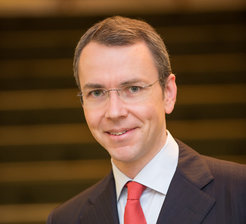Professor Immanuel Bloch receives European Science Award from the Körber Foundation
He will receive the award for his work in the area of quantum simulation with ultracold atoms.
Professor Immanuel Bloch, Director at the Max-Planck-Institute of Quantum Optics and Professor for Experimental Physics at the Ludwig-Maximilians-Universität Munich, has been elected by the Körber Foundation for the “2013 Körber European Science Prize ”. The foundation has been established in 1959 by Kurt Körber, an industrialist from Hamburg. Prof. Bloch will receive this award for his “pioneering work in the area of quantum simulation with ultracold atoms which opens new research fields at the interface of quantum optics, quantum information processing, and solid state physics.”

Immanuel Bloch, born in 1972, began his studies in physics at the Friedrich-Wilhelms-Universität in Bonn where he received his diploma in 1996. After having spent one year of research at Stanford University he joined the Laser Spectroscopy Division of Professor Theodor W. Hänsch (MPQ and LMU). In 2000 he obtained his doctoral degree from the LMU. He continued his research in the Hänsch group until he became appointed as Professor at the Johannes Gutenberg-Universität Mainz. Since 2008 he has been Director at the MPQ and leader of the Quantum Many-Body Systems Division, and since 2009 Chair of Quantum Optics at the Ludwig-Maximilians-Universität Munich.
His main research topic is the investigation of ultracold quantum gases in crystals of light generated by laser beams, so-called optical lattices. Prof. Bloch has set up a variety of experiments in his laboratories both at the MPQ and the LMU. The ultracold atoms in the optical lattices play the part of the electrons in solid states crystals, with 10.000 times larger lattice spacings. As the properties of the quantum particles and the interaction between them can be manipulated with high control the atomic quantum gases can act as models for solid states, simulating for example insulating, conducting or superconducting behaviour. “Based on new insights into many-body systems we hope to be one day able to design materials with tailored quantum properties”, Prof. Bloch points out. Furthermore, the novel high-precision techniques for addressing and manipulating atoms in optical lattices developed in the Bloch-group open the perspective of using these particles as quantum bits in a quantum computer.
Immanuel Bloch has been awarded with several highly renowned scientific awards. Twice he has won the Philip Morris Research prize (in 2000, together with Prof. Hänsch, and in 2007). In 2002 he has received the Otto Hahn Medal of the Max Planck Society, in 2005 the Gottfried-Wilhelm-Leibniz prize of the Deutsche Forschungsgemeinschaft (DFG), the German National Merit Medal, and the International Commission of Optics Prize. In 2011 the European Physical Society (EPS) has given to him the “2011 Prize for Fundamental Aspects of Quantum Electronics and Optics”, and only in February this year he has been awarded with the Hector Science Prize 2012.
Prof. Immanuel Bloch will receive the Körber Award which is endowed with 750.000 Euro at a prize ceremony in the Town Hall of Hamburg on September 6, 2013. Olivia Meyer-Streng
